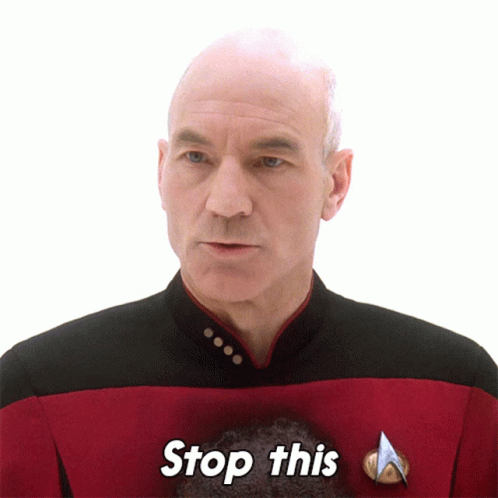Ricochet is the best place on the internet to discuss the issues of the day, either through commenting on posts or writing your own for our active and dynamic community in a fully moderated environment. In addition, the Ricochet Audio Network offers over 50 original podcasts with new episodes released every day.
 All Stop on the mRNA Vaccines
All Stop on the mRNA Vaccines
Just How Bad Are the mRNA Vaccines? And just how wrong was I about them? I always knew not to trust them uncritically. I always took seriously the concerns with them. After a while, I concluded that “It’s Still Warp Five for the mRNA Vaccines,” although there were reasonable concerns and, certainly, there was no need to hassle Covid recoverees or children to take them. Later, after some work “Rethinking the mRNA Vaccines,” I was able to have some cautious optimism while recognizing that Omicron is an improvement on earlier forms of Covid and that, for young males at least, Omicron is almost certainly safer than the mRNA vaxxes.
Things look worse now. I think it’s time to call “All stop!” on this thing. Drop the ship out of warp! Or, to drop the Star Trek metaphors instead, it’s time to stop all public policies promoting, compelling, or paying for mRNA vaccines for Covid. At this point, a friendly suggestion to the very vulnerable (elderly, obese, etc.) to consider this or another vaccine from time to time is the most we should do.
Why is it time to quit?
 Well, it’s complicated. I’ve saved over fifty URLs of things I’d like to look into concerning various claims about mRNA vax problems. This is a Gordian Knot of vaccine information, and as far as I can tell I only have four options:
Well, it’s complicated. I’ve saved over fifty URLs of things I’d like to look into concerning various claims about mRNA vax problems. This is a Gordian Knot of vaccine information, and as far as I can tell I only have four options:
1. Trust the experts.
2. Apply some heuristics.
3. Try to untangle the knot myself.
4. Cut through the knot.
A consideration of these options leads to the conclusion that it’s time to stop the push for mRNA vaxxes, especially when we look at Option 4.
Option 1: “Trust the experts” is right out.
I should be able to trust some public health officials, but I can’t after all their epic Covid policy failures. I now trust these guys like I trust Democrats to spend money responsibly. Internet independent thinkers are better, but just trusting them doesn’t solve all our problems either. For example, I’m pretty sure I can trust Dr. Vinay Prasad to be honest and knowledgeable, but it’s still possible to catch him falling for fallacious arguments.
Option 2: “Apply some heuristics” ain’t a bad idea.
 Everyone else is doing it, and why shouldn’t they? For example, I could use a heuristic like “Follow the money” to conclude that it’s entirely plausible that the corrupting influence of money and power, maybe with a little help from groupthink and politics, supported these extra-big Big Pharma products much more than they deserved.
Everyone else is doing it, and why shouldn’t they? For example, I could use a heuristic like “Follow the money” to conclude that it’s entirely plausible that the corrupting influence of money and power, maybe with a little help from groupthink and politics, supported these extra-big Big Pharma products much more than they deserved.
Or I could use a heuristic like “There’s a bit of a pattern here, don’t you think?” Then I could reasonably conclude that the vaccines that have all the known problems also have some of the other problems people are talking about. Drip by drip, we already have a lakeful of information on the failures of these vaccines; there is probably more to come. Or I could use the same heuristic to conclude that the people who badly botched over 90% of Covid policy badly botched vaccines too. Or to conclude that censored views will turn out to be true–again. Or that the people whose warnings about mRNA vax problems have already been shown to be correct will be shown to be correct in the future.
No, not a bad idea at all. I have plenty of tentative leanings in this direction. Option 2 ain’t looking good for the mRNA vaxxes.
Option 3: “Try to untangle the knot myself” is still on the table, but it’ll have to wait.
Do I look like I have that kind of time? Maybe I’ll try a little of it later. I still have those fifty-plus links! Maybe I can select a very few and drop some logic on them.
Option 4: “Cut through the knot” is the big one!
This approach is simple. It works well. And it’s not looking good for the mRNA vaccines.
Episode 1,596 of Ben Shapiro’s podcast is spot on. The best heuristic is to trust some trustworthy experts, but that only works when we have trustworthy experts. These days, until we get some new institutions to replace or at least compete with our old corrupt institutions, trustworthy experts is just what we don’t have.
So until I have more time to think, it sure would be nice to find some way of cutting through the whole problem. And there is a way. Here are a few things we know:
- The mRNA vaccines are a new, experimental technology.
- There is no long-term data on the effects of this technology.
- The mRNA globules don’t all stay where they’re supposed to.
- Myocarditis is a confirmed side-effect of the mRNA shots, for younger males especially.
- These shots don’t prevent infection.
- They don’t prevent transmission.
- Omicron is uncontrollable.
- Omicron, when there are symptoms at all, tends to range in severity from mild cold to bad flu.
- A majority of us have almost certainly had Omicron by now.
- Omicron confers superb immunity.
In order to know whether there is any ongoing need for the mRNA vaccines, I don’t have to know whether there ever was. I don’t have to evaluate dozens of claims and counter-claims about VAERS. I don’t have to learn how to do statistics. I don’t have to learn new vocabulary words. I don’t have to figure out how strong is the insurance data evidence that they’re killing people. I don’t have to wait for someone to provide me with the relevant information on how often European footballers suddenly fell over and died before 2020, how many after Covid hit but before mass vaccination, and how many after mass vaccination. I don’t have to spend a few hours studying reverse transcriptase. I don’t have to determine whether Peter McCullough, once a strong candidate for the position of Texas’ Greatest Research Doctor, is somehow a nut or whether he’s still a great research doctor and the establishment that made him a pariah were fools to do so.
 All of that stuff matters, and I hope to look into at least some of it eventually, and the heuristics indicate it won’t turn out well for the mRNA vaccines if I ever do.
All of that stuff matters, and I hope to look into at least some of it eventually, and the heuristics indicate it won’t turn out well for the mRNA vaccines if I ever do.
But we can know enough now, even without all that, to know whether it’s time to stop. If there was ever a need for these vaccines, the time has passed. If anyone actually needs the mRNA vaccines, it’s probably someone who’s a member of both of two minority groups: Those who have not yet had Covid in any form, and those whose age or obesity makes Omicron a real threat.
Meanwhile, everyone who is a member of either of two majority groups–those who have had Covid and those who are not particularly vulnerable–should not be pressured into taking an experimental biotechnology injection they don’t need. And the public should not have to pay for it.
It’s time to stop.
Published in Domestic Policy



Yes, those points are irrelevant to the discussion of whether the vaccines are vaccines.
They are important points, though, especially the one about mandates. That’s why I wish people who are opposed to mandates wouldn’t destroy their own message with nonsense about whether the vaccines are vaccines.
There are a lot of reasons to oppose mandates, including the ones you mentioned. I don’t know exactly how long previous vaccines were tested before being made available, but certainly for longer than the current ones. One reason for that is that some of the vaccines based on “weakened” viruses had a way of reverting to the deadly virus, and you needed extensive testing to be certain that your weakened virus wouldn’t do that. It can come down to a balancing of one risk vs another, but the default should be that those decisions should be left up to individuals and families. If the disease were as deadly as it first seemed it might be, and every tenth person was dropping dead in the streets, and if the vaccines were more effective in stopping transmission, maybe a strong case could be made to give in to a popular demand for mandates, but the disease wasn’t like that, the vaccines aren’t like that, and there was no popular demand like that.
But the people who make false statements about the vaccines not being vaccines, or wild claims of how the vaccines are killing millions of people, are just undermining their own message. The world perhaps shouldn’t be like that. One crazy statement out of someone’s mouth shouldn’t negate a true statement out of the same mouth, but that’s the way it works, whether the crazy statement comes from the CDC (and there were some of those) or from those opposed to mandates.
A bunch of vaccines were hastily developed worldwide, some used the mRNA approach, others did not. Obviously no long-term studies were done of any of them, as a Covid vaccine that isn’t available until 2030 would have rather limited utility.
As for “minimal” testing, I read somewhere that it took the Moderna scientists about a week to develop their mRNA vaccine after the Covid DNA sequence was first published, i.e. they had a vaccine ready to go before we had even started lockdowns in March 2020. The FDA didn’t grant Emergency Use authorization until late in the year, November I think. So it had about 8 months of testing, give or take.
No, I’m against the mandates.
Says the guy who spent all that time not knowing what I was asking?
You mean the president?
@thereticulator, I know that no vaccine is 100% effective in preventing infection, but to be called a vaccine, shouldn’t it be somewhat effective? At least 90%? 80%? 50%? Can you put a number on it? Because with my circle of friends and extended family, the percentage of vaccinated people who got Covid is significantly higher than non-vaccinated people. I would put it around 75% to 50%. Or can something be called a vaccine without being able to reduce infection rate significantly?
If you have a vaccine that isn’t effective, it’s just a useless vaccine. The mRNA vaccines, though, are very effective, so it’s a moot point. They’re not very good at preventing initial infection in the upper respiratory tract, though some of the bizarre booster mania we’re seeing seems to be based on trying to make them effective at that. That’s a pretty elusive goal for this kind of disease, and it seems there isn’t much hope for anything but temporary, partial success on that front. But in giving your immune system a huge head start in keeping the the infection from spreading to the lungs and endothelial cells where things can get serious, they’re pretty good. That’s pretty important for us oldsters. But it also means that as a public health measure (preventing transmission) these vaccines are not very good. Not worthless, but not very good. They don’t provide any basis for vaccine mandates.
To understand what’s going on with that, people need to pay attention not only to what the vaccine does to produce antibodies, but also B- and T-cells and their effect on the virus. Note that the latest FDA approval (and CDC recommendation) on the bivalent booster is based only on the data on antibody levels in mice. There has been no testing beyond that. That is crazy — to the same degree that saying the vaccines are not vaccines is crazy — and it’s also due to heavy-handed politicization by the Biden administration. Vinnie Prasad’s videos (and writeups) this week tell how it’s just getting more politicized, more bizarre, and more corrupt, even in the past week.
People like the scientists on the panel that does This Week in Virology have been reminding us for many months that the story is more than just antibody levels in your blood. The politicized public health establishment is now ignoring that, and the people who equate vaccine success only with success against initial infection are also ignoring that. It’s tempting to say that those two factions deserve each other.
The so called vaccine has not been demonstrated to do a anything positive. The whole “well you get less sick” is unprovable. In fact, people getting less sick coincides with less dangerous variants.
Meanwhile, since they admit it does not stop transmission, there is no reason to force it on kids.
So, why are they? Money, corruption, compliance.
Not so much unprovable as there are problems with both the cases examined and that the bar for “success” is so low.
How many cases are not reported because the cases are mild and the patient never bothers seeking any treatment? How many of the vaccinated (who are showing concern over the disease) are given a reassuring pat on the head and sent home, while the unvaccinated are held onto longer because they’re unvaccinated? “Prevention of hospitalization” is so nebulous that it isn’t the killer refutation that the vaccines’ supporters think it is. “Prophylactic therapeutic” is more accurate than “vaccine”, unless you stretch the definition of vaccine to include it.
And, anecdotally at least, it seems that the vaccinated have been getting infected at a higher rate than the unvaccinated.
If I could find 8 mice to test chloroquine on, would the feds support chloroquine?
Sure it’s provable. If, during the old variants, vaccinated people of a given age group were ten times less likely to be hospitalized and ten times less likely to die than unvaccinated people of the same age group, that’s pretty interesting for most people of that age group. If the same holds true during the more recent variants, that’s pretty good proof for most of us. I don’t think you could reasonably ask for better.
But you’re right that there is no reason to force it on kids, even if it slows down transmission somewhat. (And how much that “somewhat” really amounts to is hard to say. Certainly not enough to justify forcing it on kids or anyone else.)
As to why they are doing it, I’d say a) because some people get their jollies by mandating things. (Maybe that’s the same as your “compliance.”) And it’s hard to rule out money and corruption after watching the shenanigans among Pfizer, Joe Biden, and the FDA during the last week (on top of what we saw earlier).
Have not seen proof it Does anything
Or at all? It is my understanding that the current claims are the shots will reduce serious effects of COVID on older/compromised people. There is no claim of preventing infection or transmission. Am I wrong?
That’s my understanding too. Even though it’s ineffective in preventing the initial infection, it’s still a vaccine, albeit a lousy vaccine. But since I don’t want to be spouting off on subject that I don’t know much about, let me add a disclaimer that that’s no guarantee that you’re not wrong! We could both be way off! Welcome to my life!